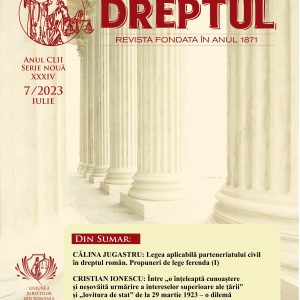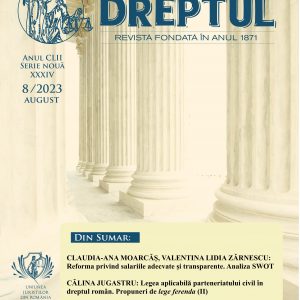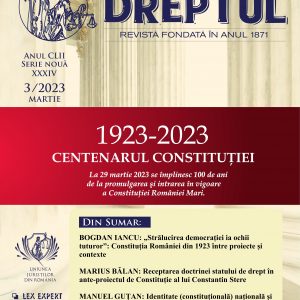-
 After the author has analyzed in a previous study the need to take into account the legitimate defence in the field of cybercrime and has emphasized the aspects of the conditions of the attack, in this material there are analyzed the legitimate retaliation and the state of necessity. In this context, the author has tried to emphasize the problems that may arise in relation to the conditions relating to defence (legitimate retaliation), also seeking to provide a theoretical framework capable of providing applicability to the institution of self-defence. An important aspect analyzed in this paper has been the putative self-defence, which could be a key aspect in the discussion on the legitimate retaliation. Equally, it has been examined inclusively the institution of the state of necessity, also drawing conclusions on the relationship between this institution and the institution of self-defence.
After the author has analyzed in a previous study the need to take into account the legitimate defence in the field of cybercrime and has emphasized the aspects of the conditions of the attack, in this material there are analyzed the legitimate retaliation and the state of necessity. In this context, the author has tried to emphasize the problems that may arise in relation to the conditions relating to defence (legitimate retaliation), also seeking to provide a theoretical framework capable of providing applicability to the institution of self-defence. An important aspect analyzed in this paper has been the putative self-defence, which could be a key aspect in the discussion on the legitimate retaliation. Equally, it has been examined inclusively the institution of the state of necessity, also drawing conclusions on the relationship between this institution and the institution of self-defence. -
 Given the importance that cybercrime is acquiring, the author has appreciated as being necessary to make an analysis on the applicability of self-defence and state of necessity in the context of cybercrime. Having as premise the necessity of justifying the retaliation in the virtual environment, the author has attempted to identify arguments in order to support the thesis according to which the self-defence and the state of necessity may find their applicability including in this area. Beyond analyzing the problematic issues related to this topic, we have tried, therefore, to emphasize the hypothetical situations in which a cyber (digital) attack is likely to give an outline to the state of self-defence or to the state of necessity.
Given the importance that cybercrime is acquiring, the author has appreciated as being necessary to make an analysis on the applicability of self-defence and state of necessity in the context of cybercrime. Having as premise the necessity of justifying the retaliation in the virtual environment, the author has attempted to identify arguments in order to support the thesis according to which the self-defence and the state of necessity may find their applicability including in this area. Beyond analyzing the problematic issues related to this topic, we have tried, therefore, to emphasize the hypothetical situations in which a cyber (digital) attack is likely to give an outline to the state of self-defence or to the state of necessity. -
 The dilemma on the bicameralism or unicameralism of the EC/EU legislator has existed for a long time. Not a few times, given the name of Parliament, operating with relative similarities regarding the states as subjects of international law, it was considered that it was and remained the legislature of the EC/EU. Over time, primary law and practice were likely to clarify things. Thus, at the beginnings of the Community construction, the Council acted as genuine supreme legislator, which had been gradually joined, as an institution of political control, consultation, cooperation and co-decision, by the European Parliament, so that currently the two institutions are equally involved in the legislative process of a two-chamber system.
The dilemma on the bicameralism or unicameralism of the EC/EU legislator has existed for a long time. Not a few times, given the name of Parliament, operating with relative similarities regarding the states as subjects of international law, it was considered that it was and remained the legislature of the EC/EU. Over time, primary law and practice were likely to clarify things. Thus, at the beginnings of the Community construction, the Council acted as genuine supreme legislator, which had been gradually joined, as an institution of political control, consultation, cooperation and co-decision, by the European Parliament, so that currently the two institutions are equally involved in the legislative process of a two-chamber system. -
 Analyzing the jurisprudence of the past three decades whereas tort law is concerned, one can easily find some gray areas, where the doctrinal principles developed so far seem to have fallen behind the realities of our modern society. Such a gray area is being analyzed by the author of this study, and it is attributed by modern doctrine to the jurisprudence applying the precautionary principle. Developed in the area of international public law, adapted to private law, and embraced by modern doctrine, the precautionary principle is a prominent figure in European legislation, as well as in our national laws, and lately also in court decisions.
Analyzing the jurisprudence of the past three decades whereas tort law is concerned, one can easily find some gray areas, where the doctrinal principles developed so far seem to have fallen behind the realities of our modern society. Such a gray area is being analyzed by the author of this study, and it is attributed by modern doctrine to the jurisprudence applying the precautionary principle. Developed in the area of international public law, adapted to private law, and embraced by modern doctrine, the precautionary principle is a prominent figure in European legislation, as well as in our national laws, and lately also in court decisions. -

-

-
 Fiducia is a legal institution brought into the Romanian national legislation by the entry into force of the New Civil Code. Introducing the institution of fiducia in the national law is the result of adapting national legislation to the new today’s legal and economic realities. The new Civil Code includes regulations applicable to fiducia with / without extraneity element. Regulation of this new institution has theoretical and practical significance as the procedure is a way of protection from creditors. Applying these regulations to particular factual situations requires knowledge and analysis of specific elements of fiducia.
Fiducia is a legal institution brought into the Romanian national legislation by the entry into force of the New Civil Code. Introducing the institution of fiducia in the national law is the result of adapting national legislation to the new today’s legal and economic realities. The new Civil Code includes regulations applicable to fiducia with / without extraneity element. Regulation of this new institution has theoretical and practical significance as the procedure is a way of protection from creditors. Applying these regulations to particular factual situations requires knowledge and analysis of specific elements of fiducia. -
 The globalization phenomenon is inevitably leading to a development, without precedent, of the international trade, in general, and of the freight, a situation that emphasizes the current complex issue of defining the law applicable to the international contract of maritime freight, and also the enhancement of afforts for the elaboration of an uniform frame applicable to international trade contracts in general, by the specialized institutions – UNCITRAL, UNIDROIT, the Hague Conference on international private law; the existence of an uniform law proves to be the best solution in order to avoid difficult issues caused by the conflict of laws, process which is constantly developing without achieving the elaboration of an universal interstate convention, that could unify the conflict solutions applicable to all international trading contracts, and consequently, at least for the time being, the conflict of laws is not completely eliminated. From this perspective, the law applicable to the international charter party has been analyzed according to the European Committee Regulation no. 593/ 2008 of the Europea Parliament and Council regarding the law applicable on contractual obligations – Rome I, and according to the inter-American Convention on the law applicable on international contracts (CIDIP Convention).
The globalization phenomenon is inevitably leading to a development, without precedent, of the international trade, in general, and of the freight, a situation that emphasizes the current complex issue of defining the law applicable to the international contract of maritime freight, and also the enhancement of afforts for the elaboration of an uniform frame applicable to international trade contracts in general, by the specialized institutions – UNCITRAL, UNIDROIT, the Hague Conference on international private law; the existence of an uniform law proves to be the best solution in order to avoid difficult issues caused by the conflict of laws, process which is constantly developing without achieving the elaboration of an universal interstate convention, that could unify the conflict solutions applicable to all international trading contracts, and consequently, at least for the time being, the conflict of laws is not completely eliminated. From this perspective, the law applicable to the international charter party has been analyzed according to the European Committee Regulation no. 593/ 2008 of the Europea Parliament and Council regarding the law applicable on contractual obligations – Rome I, and according to the inter-American Convention on the law applicable on international contracts (CIDIP Convention). -
 In this study, the author analyzes the scope of Regulation (EC) no. 593/ 2008 of the European Parliament and of the Council on the law applicable to contractual obligations (also called “Rome I”) in individual contracts of employment having an extraneity element, taking into account that the provisions of this regulation are mandatory applicable in Romania, with a view to Art. 148 paragraph 2 of the Constitution and Art. 2640 of the Romanian Civil Code (Law no. 287/2009 republished).
In this study, the author analyzes the scope of Regulation (EC) no. 593/ 2008 of the European Parliament and of the Council on the law applicable to contractual obligations (also called “Rome I”) in individual contracts of employment having an extraneity element, taking into account that the provisions of this regulation are mandatory applicable in Romania, with a view to Art. 148 paragraph 2 of the Constitution and Art. 2640 of the Romanian Civil Code (Law no. 287/2009 republished). -
 Arbitrability is the entry point of arbitration: it identifies those cases which can be settled by way of arbitration and in which the parties can exclude court procedures and state courts. This article examines, in light of the applicable international treaties, the choice-of-law rule that determines the law applicable to arbitrability and, in order to establish this choice-of-law rule, analyzes the purpose of arbitrability. It argues that arbitrability should be conceived as a question of competence and not as a question emerging from public policy. It follows from this thesis that the application of the law of the forum (lex fori), the dominant approach in international treaty law, is not justified and the exclusion of arbitrability is warranted only in cases which belong to the exclusive competence of the courts of or raise real problems of public policy for the forum.
Arbitrability is the entry point of arbitration: it identifies those cases which can be settled by way of arbitration and in which the parties can exclude court procedures and state courts. This article examines, in light of the applicable international treaties, the choice-of-law rule that determines the law applicable to arbitrability and, in order to establish this choice-of-law rule, analyzes the purpose of arbitrability. It argues that arbitrability should be conceived as a question of competence and not as a question emerging from public policy. It follows from this thesis that the application of the law of the forum (lex fori), the dominant approach in international treaty law, is not justified and the exclusion of arbitrability is warranted only in cases which belong to the exclusive competence of the courts of or raise real problems of public policy for the forum. -
 The object of the general part of criminal law and its relation to the special part are still uncertain, and this is because the criminal doctrine has always neglected the general criminal norms, by focusing its attention on the norms of incrimination, which are specific to the special part. In relation to these matters, the doctrine often makes contradictory statements and, as a result, some authors have deducted that the connection between the general part and the special part of criminal law is that of a general law (common law) and a special law (exceptional law), so that a possible conflict between a general criminal norm and a special criminal norm is solved according to the rule specialia generalibus derogant. And, unfortunately, such an opinion tends to become dominant, as evidenced by the fact that the criminal legislator disregards more and more frequently the norms with value of principles of branch, which are included in the general part of the Criminal Code. Therefore, in order to combat this completely unacceptable legislative practice, the author of this paper has intended to point out that the general part is a framework-law, with a higher legal value, while the special part is a (derived) subordinate law, which can only specify (clarify) the norms of the general part, but can never derogate from them. However, starting from this premise, the author has noticed that the persisting doubt about the relation between the two parties also has a deeper cause, which resides in the fact that no modern legislator has been preoccupied with determining and explicitly providing the general conditions and rules of punishment. Although the criminal doctrine has, for a long time, noticed that the norms of incrimination lay down special rules of punishment, the scope of which is limited to a specific, well-determined offence, however, in the absence of general rules of punishment, it has concluded wrongly, that the incrimination norms are autonomous independent norms, while general criminal norms are derived (secondary) norms.
The object of the general part of criminal law and its relation to the special part are still uncertain, and this is because the criminal doctrine has always neglected the general criminal norms, by focusing its attention on the norms of incrimination, which are specific to the special part. In relation to these matters, the doctrine often makes contradictory statements and, as a result, some authors have deducted that the connection between the general part and the special part of criminal law is that of a general law (common law) and a special law (exceptional law), so that a possible conflict between a general criminal norm and a special criminal norm is solved according to the rule specialia generalibus derogant. And, unfortunately, such an opinion tends to become dominant, as evidenced by the fact that the criminal legislator disregards more and more frequently the norms with value of principles of branch, which are included in the general part of the Criminal Code. Therefore, in order to combat this completely unacceptable legislative practice, the author of this paper has intended to point out that the general part is a framework-law, with a higher legal value, while the special part is a (derived) subordinate law, which can only specify (clarify) the norms of the general part, but can never derogate from them. However, starting from this premise, the author has noticed that the persisting doubt about the relation between the two parties also has a deeper cause, which resides in the fact that no modern legislator has been preoccupied with determining and explicitly providing the general conditions and rules of punishment. Although the criminal doctrine has, for a long time, noticed that the norms of incrimination lay down special rules of punishment, the scope of which is limited to a specific, well-determined offence, however, in the absence of general rules of punishment, it has concluded wrongly, that the incrimination norms are autonomous independent norms, while general criminal norms are derived (secondary) norms. -

